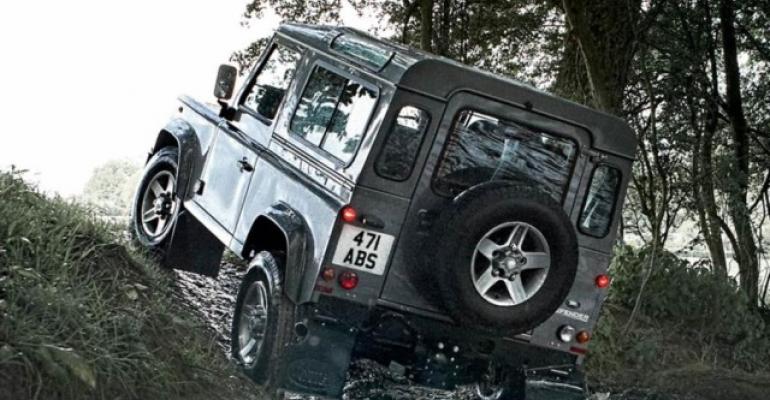VIENNA – By deciding to build a new plant with annual capacity of up to 300,000 vehicles in the Slovak city of Nitra, Jaguar Land Rover is entering a country that already boasts the world’s highest per-capita vehicle production.
Slovakia’s three car factories manufactured more than 973,643 units in 2014, down 1.4% from their best-ever output of 987,718 achieved in 2013. This figure makes Slovakia, a country with about 5.4 million inhabitants, the global leader in per-capita car output.
JLR is expected to create up to 4,000 direct jobs at its new plant, with even more workers to be hired by suppliers in the region. But the factory, due to come on line in 2018, is located within 100 miles (160 km) of the Volkswagen, PSA and Kia facilities in Western Slovakia, raising concerns that the luxury automaker may have trouble finding enough qualified workers.
“We have to look for an appropriate system of conditions for labor mobility,” Juraj Sinay, president of the Slovak Association of Automotive Industry, says in an interview with the Pravda daily Slovakian newspaper. “The fact is that in the territory of Western Slovakia the availability of workforce is on the edge, but Slovakia does not end in Nitra or in Zilina (where the Kia Motors Slovakia plant is located).”
Human-resources consulting companies also see a potential problem with worker availability. “The competition in the labor market is growing rapidly and Slovak carmakers face a desperate shortage of people, not only at skilled but also at blue-collar positions,” Jiri Halbrstat, marketing manager for ManpowerGroup in Prague, Czech Republic, tells the Hospodarske noviny business daily.
“I personally see a problem with a qualified workforce,” Darina Mokranova, executive director of the Index Noslus employment agency in the Slovakian capital of Bratislava, is quoted as saying by Hospodarske noviny. “This issue will deepen with the arrival of (JLR).”
Both the automotive industry and human-resources experts underline the importance of starting training measures in time for new hires to be ready when needed. Housing near the new JLR plant also will be an issue.
Jaguar Poaching?
It is likely JLR, owned by Indian conglomerate Tata, will try to attract some people currently working for Volkswagen, PSA or Kia as it establishes its first manufacturing facility outside the U.K.
Volkswagen Slovakia, which in 2014 manufactured 394,747 vehicles, including finished Porsche Cayenne bodies shipped to Leipzig, Germany for final assembly, is located in Bratislava. Trnava, located about 30 miles (50 km) northeast of Bratislava, is the home of French automaker PSA’s Slovak subsidiary. The plant produced 255,176 cars last year.
Kia Motors Slovakia, which built 323,720 cars in 2014, is located near Zilina, some 120 miles (200 km) northeast of Bratislava. Nitra, where the JLR factory will be located, is 60 miles (100 km) east of the capital.
Poland’s government is unhappy about JLR’s decision. During the past 15 years Poland was seen as a potential site for several new car plants that eventually were constructed in the Czech Republic, Slovakia or Hungary.
Janusz Piechocinski, Poland’s Deputy Prime Minister and Minister of Economy, says Slovakia had offered JLR state subsidies which Poland declined to match.
“Slovakia was ready to pay much more than we could secure in our budget,” he told a press conference. “The distribution of the benefits and costs would be irrational from the point of view of not only the jobs that would be created, but also burden for budget in the future. We do not fight for the investor at any price.”
However, while Polish authorities see Slovakia’s generous investment incentives as the main reason for JLR’s decision, there are other reasons as well. Among them is a well-established network of Slovakia-based suppliers producing a wide range of parts for local as well as other European auto plants.
The suppliers, mainly subsidiaries of foreign companies, manufacture parts for premium cars. Their customers include Volkswagen Slovakia which, in addition to building Cayenne bodies for Porsche, manufactures models such as the Audi Q7 and VW Touareg SUVs. It also is producing unpainted bodies for Bentley’s first SUV, the Bentayga.
As JLR plans to produce a range of aluminum vehicles at its new Slovak site, the fact that the lightweight technology introduced to the region by Volkswagen also may have played a role in its site selection.
VW Slovakia, which pioneered the use of aluminum in car production in the country, early this year launched volume production of the new-generation Audi Q7 which includes a significant share of lightweight materials.





